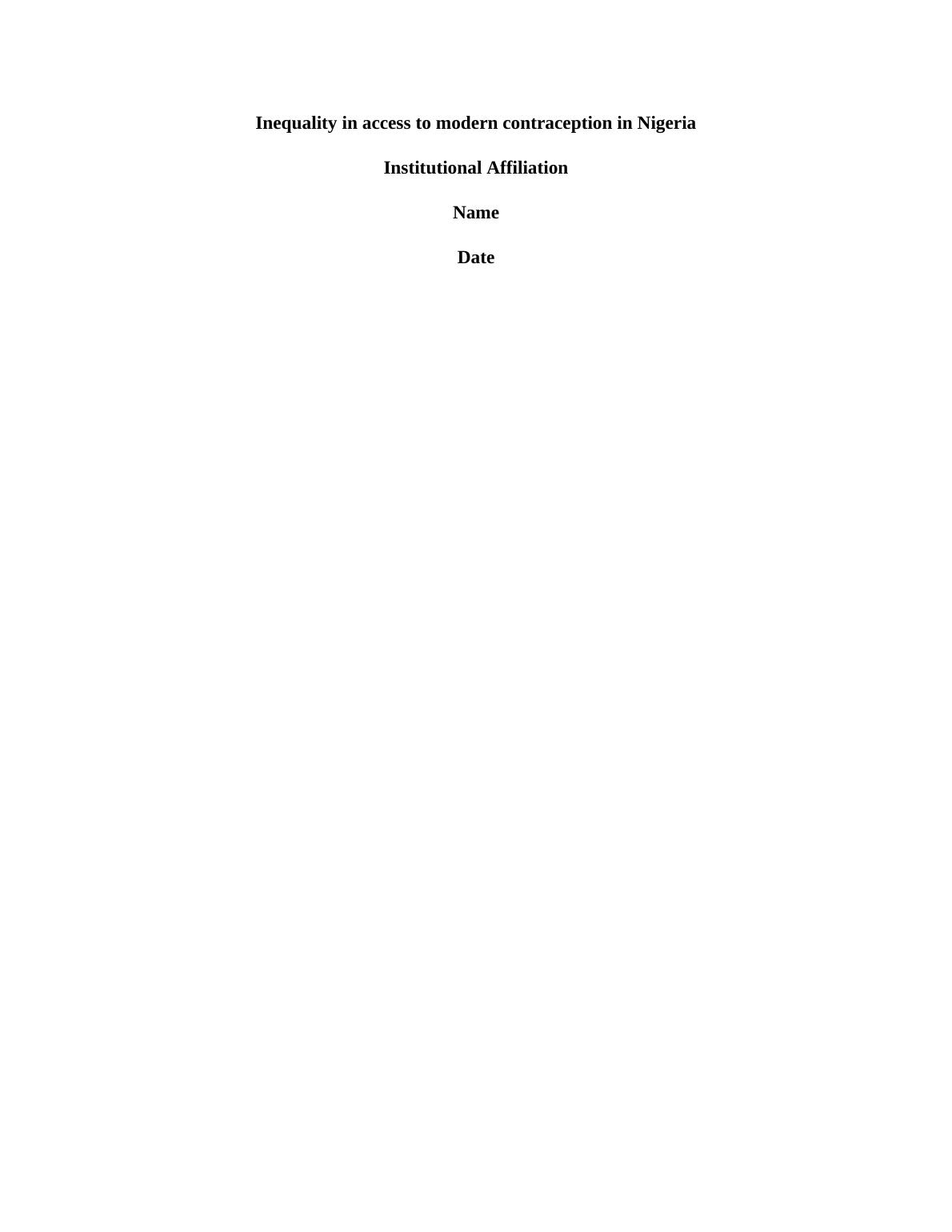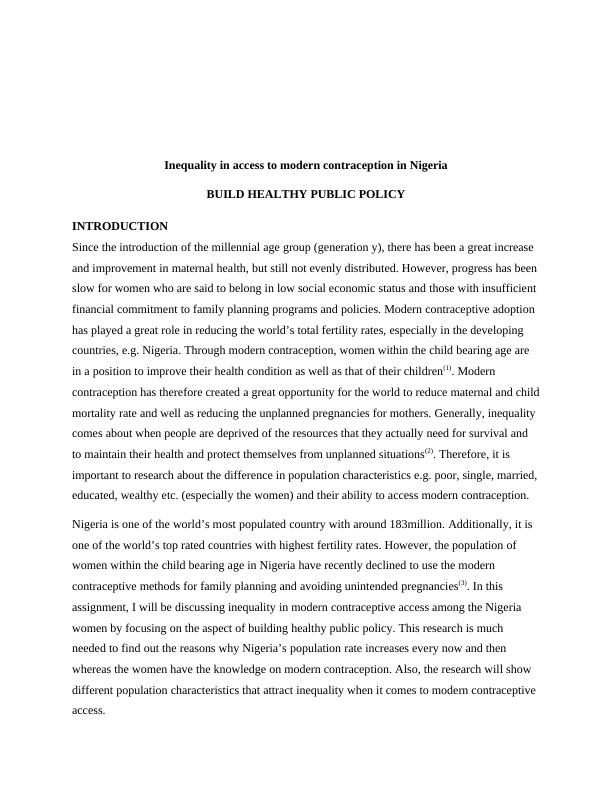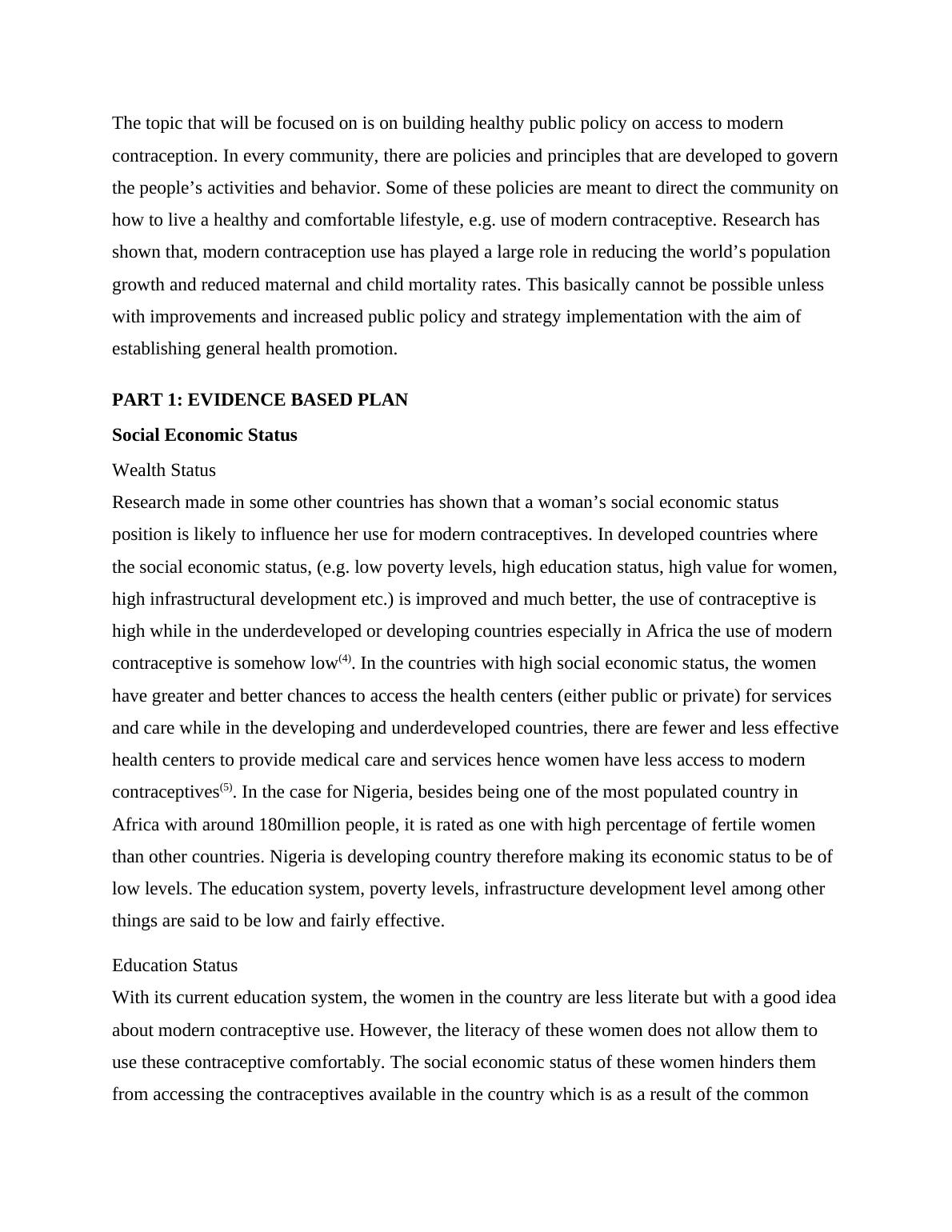Contraceptive Use Among Nigerian Women With no Fertility Intention
9 Pages3333 Words71 Views
Added on 2020-05-11
Contraceptive Use Among Nigerian Women With no Fertility Intention
Added on 2020-05-11
ShareRelated Documents
Inequality in access to modern contraception in NigeriaInstitutional Affiliation Name Date

Inequality in access to modern contraception in NigeriaBUILD HEALTHY PUBLIC POLICYINTRODUCTIONSince the introduction of the millennial age group (generation y), there has been a great increase and improvement in maternal health, but still not evenly distributed. However, progress has beenslow for women who are said to belong in low social economic status and those with insufficient financial commitment to family planning programs and policies. Modern contraceptive adoption has played a great role in reducing the world’s total fertility rates, especially in the developing countries, e.g. Nigeria. Through modern contraception, women within the child bearing age are in a position to improve their health condition as well as that of their children(1). Modern contraception has therefore created a great opportunity for the world to reduce maternal and childmortality rate and well as reducing the unplanned pregnancies for mothers. Generally, inequality comes about when people are deprived of the resources that they actually need for survival and to maintain their health and protect themselves from unplanned situations(2). Therefore, it is important to research about the difference in population characteristics e.g. poor, single, married,educated, wealthy etc. (especially the women) and their ability to access modern contraception.Nigeria is one of the world’s most populated country with around 183million. Additionally, it is one of the world’s top rated countries with highest fertility rates. However, the population of women within the child bearing age in Nigeria have recently declined to use the modern contraceptive methods for family planning and avoiding unintended pregnancies(3). In this assignment, I will be discussing inequality in modern contraceptive access among the Nigeria women by focusing on the aspect of building healthy public policy. This research is much needed to find out the reasons why Nigeria’s population rate increases every now and then whereas the women have the knowledge on modern contraception. Also, the research will show different population characteristics that attract inequality when it comes to modern contraceptive access.

The topic that will be focused on is on building healthy public policy on access to modern contraception. In every community, there are policies and principles that are developed to governthe people’s activities and behavior. Some of these policies are meant to direct the community onhow to live a healthy and comfortable lifestyle, e.g. use of modern contraceptive. Research has shown that, modern contraception use has played a large role in reducing the world’s population growth and reduced maternal and child mortality rates. This basically cannot be possible unless with improvements and increased public policy and strategy implementation with the aim of establishing general health promotion.PART 1: EVIDENCE BASED PLANSocial Economic StatusWealth StatusResearch made in some other countries has shown that a woman’s social economic status position is likely to influence her use for modern contraceptives. In developed countries where the social economic status, (e.g. low poverty levels, high education status, high value for women,high infrastructural development etc.) is improved and much better, the use of contraceptive is high while in the underdeveloped or developing countries especially in Africa the use of modern contraceptive is somehow low(4). In the countries with high social economic status, the women have greater and better chances to access the health centers (either public or private) for services and care while in the developing and underdeveloped countries, there are fewer and less effectivehealth centers to provide medical care and services hence women have less access to modern contraceptives(5). In the case for Nigeria, besides being one of the most populated country in Africa with around 180million people, it is rated as one with high percentage of fertile women than other countries. Nigeria is developing country therefore making its economic status to be of low levels. The education system, poverty levels, infrastructure development level among other things are said to be low and fairly effective.Education StatusWith its current education system, the women in the country are less literate but with a good ideaabout modern contraceptive use. However, the literacy of these women does not allow them to use these contraceptive comfortably. The social economic status of these women hinders them from accessing the contraceptives available in the country which is as a result of the common

End of preview
Want to access all the pages? Upload your documents or become a member.
Related Documents
Women’s Health in Egypt: Contraception, Fertility, and Government Policies.lg...
|6
|1521
|430
Women's Health Education: Practices, Laws, and Effects on Healthlg...
|6
|1417
|129
Importance of Sexual Health Education in Egyptlg...
|6
|1405
|152
Effects of Birth Control Methods on Birth Rate and Maternal Healthlg...
|9
|2275
|72
Report on Challenges Faced by Women in Nigerialg...
|14
|2937
|91
Health Governance and Economicslg...
|10
|3496
|91
